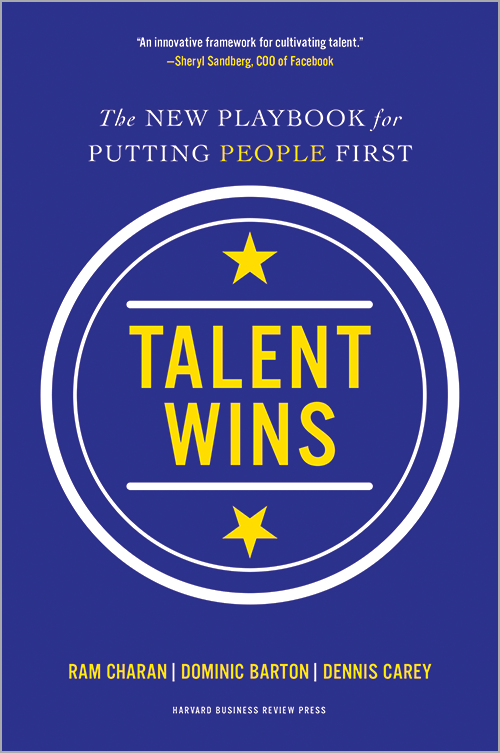Talent Wins
The New Playbook for Putting People First


A veritable power play of authors. Ram Charan is a former Harvard faculty member and now a best-selling author and world renowned advisor to CEOs at the largest global organizations . Dominic Barton is the Global Managing Partner of McKinsey & Co, the leading global strategy consultants. Dennis Carey is Vice-Chairman of Korn Ferry, the executive search and leadership consultants. All three spend their days interviewing and understanding the challenges of CEOs of influential organizations across the globe.
The authors have front row seats in watching the challenges of large organizations unfold, and exceptional access to the boardrooms of the top executives in charge of those organizations. With that view they observe that "as work and organization become more fluid…..talent must lead strategy". This is a seismic acknowledgement from the head of the world's foremost strategy consultancy, but is probably a truism nonetheless. If 'culture eats strategy for breakfast' then it is the talent that you need to look to, to ensure and enable change. They go on to state that "putting talent first means a complete transformation of the way most companies have done business for decades." This is a call to arms for business to switch its focus from beautifully engineered plans, that click solidly together (at least on paper) which was the 20th century approach to managing corporate growth; to the more fluid continual evolution of organizations that is now required to stay in the game in the 21st century.
Listen to our podcast with Dennis Carey here.
At the heart of this approach lie two significant changes. The main task for leaders of organizations is now, not so much to lead from the front, but to create environments where change can happen most effectively, be "architects" for change in their phrase. And secondly – and perhaps most radically – the key triumvirate to lead this change now includes the CHRO, alongside the CEO and CFO. It is only in the last decade that the executive with responsibility for human capital has been making it to the board room at all – and now they are being seen as leap-frogging heads of strategy, marketing, operations and even the latest arrival, Chief Digital Officers.
The focus for the board has often been TSR – Total Shareholder Return, the authors switch this acronym to now mean Talent, Strategy, Risk which inately seems a more holistic approach, and connects the various drivers and barriers to growth neatly. Managing human capital as effectively as financial capital has many consequences, primarily there is going to be an increased demand for ways to measure and improve human capital, that the uthors explore here.
The concept of an "M&A strategy for talent" is introduced. Bringing the sexiest of strategy and finance activities to the HR function, in seeking out the best new talent available. The notion is likely to bring far more value than corporate M&A deals ever have, which are notoriously poor at creating value. The onus will be on the CEO to work very closely with the CHRO on managing the acquistion, deployment, development and motivation of talent, "they'll get granular on [these] issues…to maximise the impact of the critical 2 percent and the growth and continuous learning of the 98 percent".
Much of what Charan, Barton and Carey put forward here is not new. Many people in the HR world have been saying similar for years – the radical, ground-breaking change is that the authors come from beyond the often over-looked and relatively uninfluential waters of the HR function, and are not scoffing at the HR role as a necessary administrative evil, but seeing it as the key to unlock organizations' hidden value – and that it is the CEO's role to harness that. The championing of talent is not new, but the championing of the HR role is game-changing.
The book goes into detail on seven key steps needed to make this transformation happen, ending with a CEOs playbook to enact these changes. Time will tell if the world really will "elevate HR to the same level as Finance" as the authors argue for.

Title: Talent Wins: The New Playbook for Putting People First
Author/s Name/s: Ram Charan, Dominic Barton, Dennis Carey
Publisher: Harvard Business Review Press
ISBN: 978-1-63369-118-6
Publishing Date: March 2018
Number of Pages: 167
Author Knowledge Rating: 1-5 (based on their years of experience, academic expertise in subject areas, and exposure to cross-functional thinking in the area)





















































































Readability: 1-5 score(1=dense and v academic; 5=frantic; page turner)









































































































Appropriate Length: (1=could have been written in 25% of the length;5=could have been longer)









































































































Core Idea Value: (1=nonsense (or entirely esoteric); 5=game-changer)








































































































